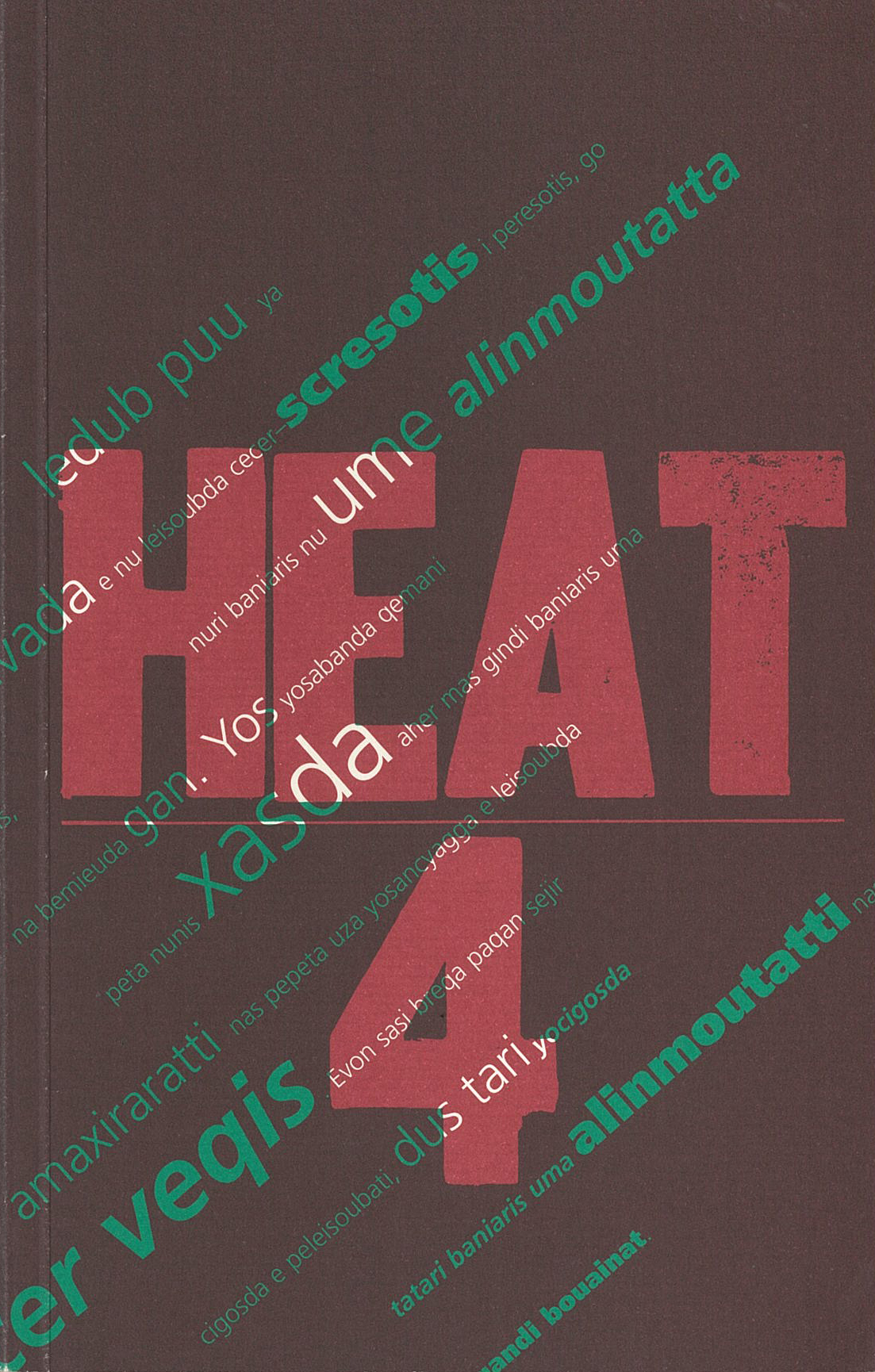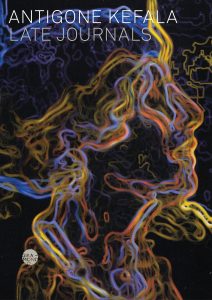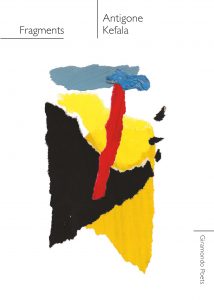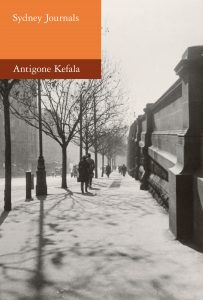Journal I
January
Very, very hot. The city humid and alive with people. Reading Montale, his critical writing. Very good, ironic, but seldom enthusiastic, his inner self is constantly waiting for something to overwhelm him, but nothing happens, his sense of irony, and of knowing more than the thing observed, slightly undermines the moment. Harsh on Brancusi.
All religions, romantic notions related to the Absolute – how to reach it, touch it, draw strength from it. Such a force, I imagine, would burn us out – if touched.
Jane Austen in a letter to Fanny: ‘Single women have a dreadful propensity for being poor.’
Yesterday a heat wave, the night oppressively hot, no wind, just this stale air coming through the windows. Fell asleep. Towards morning the wind came up, blowing in short gusts, ruffling the bedclothes, as if human. Above it the sound in me of a didgeridoo playing, a low continuous hum and then these explosions of sound, at a higher pitch, cries of birds, shimmers of light on the water.
Little is visible on his face, yet they say he is dying. Friends come for lunch. We admire the view over the hills, the garden where the passionfruit flowers are out. The most exotic of forms, with two rings of petals, the lower one blue, the upper a series of sculptured hieroglyphics. The trees are growing, the cats lie in the shade, far away the blue ocean.
Vulnerability – he returns again and again to stories about the past, when he was small and his father would take him to the pictures, going back to a safe period.
This fate that is waiting silently inside us to unfold…
February
R. rang. He had been in bed with a cold. He came out of the house yesterday, for the first time in days, still feverish. He was looking at Sydney, he had been reading Freud on myths and totemism. The traffic stopped at some point, he was looking down a narrow lane, through to another, somehow the accumulation of signs, houses, the density of it all, he felt that Sydney had now the weight to create a culture. If one were to put all the forces on a grid he said, maybe we would reach what the French call – pesanteur.
I was telling him that when we first came out of Europe and for many years, we suffered physically from this lack of historical weight. Something that totally unbalanced us, an element that was lacking in the air, in the water, in the streets, in life, some substance that had become part of our ongoing, elemental necessity.
Ved Mehta’s depressing story on TV about his Oxford University friends – committing suicide, killing their fathers with axes, all these boys’ clubs in which they sing with one voice, drink as one and have the same brutal attitudes to women. Philosophers? What sort of inner equipment is this?
I went to the cemetery yesterday. The place milky white and empty, the sea far away. A strong wind was blowing, the same sense of desolation about the place, slightly more resistant to it now after so many years.
Over dinner, the young were laughing a great deal. It was good to hear this energy coming out, these high spirits related to nothing but youth.
‘I should like to float out of life,’ H. said to me. But life had its own ideas and in the meantime she could no longer live alone in the house. We were all there to help with the move. She looked at us as if a fallen queen trying to maintain her dignity among all these assassins that had come to destroy her life. They had already taken the piano away. She looked very thin and somehow disconnected from the scene. She suddenly asked in a naïve, detached voice: ‘What am I going to do?’
March
The days very still and very hot. The light dusted over the city. No one called, no one came. Very pleased with the silence. At night dreamt that I was in a Greek square, wide, made of marble, totally empty. Entries from four points, as if the setting of a game. At one end large flowers, trees, made of transparent material in angel pink-apricot, Mother’s colours. They were moving in the wind, immense petals, beautifully transparent and delicate…
The restaurant austere-looking but the food quite good. Every-one discussing work, new positions, possibilities. Yet it seemed that none of them had heard someone with a different accent for some time. They were listening to me politely, with an increased amount of attention, as if I were an invalid, so that the air became charged while I spoke. I found it difficult to deal with that amount of artificial attention, attacked by it, so that I lost my way, had these long pauses looking for the most ordinary expressions.
April
The autumn cry of birds in the air above the park, the milky transparency of the air above the trees, diffused in the morning sunlight. A resonance now far away, now near, urgent, repetitive.
In the morning, in the tree, a bird with a voice of sandpaper went on and on rubbing at it gutturally. Then a chorus of other birds would come in at intervals. A storyteller? Family meeting? Some important message being imparted. All quiet now.
In a biography of Giacometti: ‘He felt that in this world there can be no final view of things. Disavowing all possibilities he undertook each work as a fresh assault on the impossible.’
At the old wharf for the performance. Sydney looking very beautiful at night, lighted up with the moon on top of the buildings, coloured reflections on the water, the sea, between the two sides, a lake. An intimate feeling that you could have touched the other side if you stretched your hand.
K. came for afternoon tea. Her house full of young people, their skins alive, glowing with youth and health. Looking at them she feels that she is one of them, but when she goes to the bathroom and looks into the mirror, it is her mother’s face that looks back – displeased. We laughed.
We drove out to the farm. The countryside full of green rolling hills, constantly inviting you to reach the next one, see what is behind it.
At night we lit a fire in the open and talked. The moon was up, a beautiful full moon, a transparent luminosity was falling over the hills, the trees, as if filtered from some unseen source.
Then the horses approached, wanting company too. Powerful animals, in the light of the fire they appeared massive, mythical beings, the white one especially, the light falling on the planes of his head made of marble. But his eyes, very human, soft and humid looking at us.
Late at night, the moon round and very large, low on the horizon, in the absolute silence. Around us rusty objects, horse trailers, stables that were falling down, parts of cars and the old homestead, abandoned now.
Gilbert Becaud – an interesting documentary on the French singer. He was analysing the essence of his style on stage, a style which everyone had predicted will demolish him as a singer. He said: ‘La peur me déclenche…’
We can all say with him – fear triggers us, launches us, releases us…
May
At the exhibition last night. A young crowd all dressed in black. The paintings looked good on the white walls, the high factory ceiling. The young painter was there, the thin, wiry Greek, laughing quite freely and talking about his gardening. This is how he makes his living – compost-making; the combustion of grass – sometimes, at night, he puts the outside lights on to see the transparent blue smoke rising out of the heap.
I asked for some news on the aesthetic front, but they were not forthcoming.
Driving through the National Park after the fires, the green already coming up from the ground covering the black tree trunks…nature and the desire to live.
We stopped to photograph these beautiful black trees, the charred candle-like flowers sitting on the branches as if black birds, some dark song about the underworld, stark against the blue sky.
Writing about Rodin, Rilke once observed that ‘Fame is only the summation of all the misunderstandings accumulating around a new name.’
Trying to write, one needs so much confidence in oneself to carry even a sentence. The moment the level goes down one realises the futility of all things, the thin nature of the enterprise and language that refuses to work.
Looking at all this violence everywhere, in life, in films, we are constantly forgetting how vulnerable we are…no one seems to remember how very vulnerable we are.
After the opening we walked over Pyrmont Bridge, walked into this golden light over the sea. The city, an artificial kingdom made of glass, lights.
J. was saying that she is trying to live as much as possible in the present, but I said, writing is constantly about the past, one does nothing but rake it, like sand in a Japanese garden.
At Abdul’s for dinner. The place cold and empty, a dark night, the whole area which before used to teem with people, now as if abandoned, the food slightly tired.
We ate quickly, talked of M.’s death, this amazing instinct for self-destruction that the whole family had. His early reviews that we used to read with Mother, an amazing mixture of erudition, sensitivity and intellectual flamboyance – so rare.
His death such a waste. The last time I had met him at a launch in a pub at the Rocks, his second pair of eyes was emerging diffidently from behind his glasses, vulnerable and shy. The fast flowing of his voice, a jagged tempo, the uncertain, slightly awkward movements of his thin limbs, his walk, swimming through the air. A vestige of a youthful, authoritative tone in his voice, the one that he used in his reviews. I was talking to him about it – ‘something not acceptable any longer,’ he said, ‘could not be repeated.’
This amazing idea in all of us that we are indestructible, that the body will take everything and deal with it, again and again.
June
In Melbourne for the conference, went to visit H. to see how she is getting on.
She was downstairs in the flat complaining bitterly about the cold, repeating herself, unfocused, the family trying to cope as best they could.
At the table she put on her usual airs of a fallen royalty that had known better times, carrying her unplaced meaning above the young heads at the table, listening, frightened at the spectacle and less capable of taking it than we were, the older ones, hardened now, taking in this transformation with more equanimity, waiting for our turn, what form will it take, will we too drift in and out of memory, speak of details of little interest to anyone but ourselves…
Around the table they were eating in a strained silence, with white faces, tight lips, the dining room cold, the house, which in her imagination had always appeared grand and imposing, now shrunk with time.
Over coffee in the drawing room she confessed to me about this inner chill she now seemed to carry permanently since S.’s death. She said in this young, naive voice: ‘I thought we were going to live in our house for ever…’
In the dining room of the old hotel having breakfast. Georgia’s voice high on her continuous excitement, telling stories.
The decor in dark red discoloured with time, smoky mirrors, Vietnamese waiters, Australian food of the early period – tinned fruit, elderly sausages, overcooked gluey eggs. A historical food that was still being preserved to be offered to the genuine connoisseurs. They were sitting at the tables pretending to be discussing sotto voce, but in fact noticing, disapprovingly, all these foreigners and the noise they were making.
Z. was talking about her mother, the recent divorce and her inability to deal with it, even though she had always wanted to be free, as if the means to reach that freedom had been taken away from her.
Everyone constantly going for over-simplification, things evident, intellectually hard, what they don’t seem to grasp is that
climates develop certain types of intellectuality, that the intellect is dependent on sensibility, that you are not dealing with a universal neutral instrument that can carry the same nuances everywhere, that understanding is related to local conditions, a past, history, a way of life.
This current illusion of the universality of everything, induced one assumes by the new technologies…
Nina’s letter with the photographs brought back the image of Aunt Marilla, living in that old wooden house, her gestures shaped by her early life still carrying social manners, an implied elegance, intellectual concerns, alertness to the world, thoughtfulness, while around her the house was slowly disintegrating, the floorboards full of holes…
Then the daughter, the breakdown, the hospital rape, the child. The past seldom discussed, the war, the total destruction.
Last night I dreamt that I was in the National Gallery, the snakes were coming out of the Aboriginal paintings, moving, alive. They brought a guard to watch over them so that the visitors would not be scared.
July
At the opening of the new exhibition, last night.
When we arrived the place electrified with the colours of the paintings and vodka with cranberry juice.
Naïve, fairytales, magic birds, but slightly too glossy. The gallery full of people, everyone talking to everyone, intimate stories it seemed…this man talking to himself, to me, thin, a European-looking man, as if the formation of these years in another landscape is still clinging to us after all this time, coming out of our faces, the position of our bodies.
He had the thin face of Celan in the late photos, with a similar expression in his eyes, sad, uncertain.
What are these constant fields between us in which the ground bristles with misplaced understandings…
The apricot tree already in bloom. Yesterday, late afternoon, hanging the washing, looked up, the delicate flowers were already out, transparent wings in the cold sunlight, a gauze light passing through them, the transparency of a sticky fluid coming out of a cocoon.
July, the month of death anniversaries.
Dream last night. I was in a room where someone was dying. Chairs all around the walls, as in a Greek setting, the room in semi-darkness, murmur of voices, people waiting on the chairs. The dying high on a dais, small somehow.
I was speaking to the dying man. The woman had apparently died already. Only the eyes of the man were visible. He wanted to see water. Above the dais, suspended in the air, was a tap. I turned it on, the water came down, an illusion of water, diffused through some source of light from above, the water sparkling. The eyes of the man were pleased, he made a sign that it was enough and I turned the tap off. As I looked at him, his eyes began to fade slowly under his eyelids, a slow movement, the eyes very black and then they went out – gently.
I thought, this is how it is, pressed my face to the cover of the book in which the eyes seemed to be embedded, as if the body of the person, the surface smooth and iced, the book was already beginning to disintegrate.
I thought – death had come – and began to cry…
Auden: ‘The arts are a chief means of communication with the dead. Without communication with the dead a fully human life is not possible.’
P. discussing the importance of Gertrude Stein, how when he feels overwhelmed by words, he goes back to her, to the individual word, to clear the ground.
But in my case I don’t feel that words clutter me, on the contrary, I feel that I have to re-create them with difficulty out of thin air so to speak, their nature always too self-contained, too well defined, as if stone presences that constantly demand their singular places, demand that one should acknowledge their individual existence in relation to a meaning. I would feel that this repetitive, mechanical use means that I am letting them down, emptying them of their meaning.
August
At the opening, we arrived late, the gallery dense with people. For the first time in that sombre place a feeling of warmth. She as usual looking polite, warm and detached at the same time, in black, with that astonishing colouring of her skin, as if gold-dusted, and her red golden hair, dyed, the colour somehow totally suited to the overall effect.
But he looked devastated, his curly hair shooting in all directions, as if Medusa’s hair. His eyes very black with a desperation that he was trying to keep in check, his glass in hand, running after the waiter to fill it again. He was rushing to escape all these fires that were coming at him from all sides, laughing in a forced yet careless way.
The paintings large and sombre, an inner calligraphy that had acquired substance, black-blues, browns.
We waited for the dance to start, looking at the marvellous paintings. Seemingly simple, yet the details baroque, juxtaposing themselves in colours that miraculously dissolved into abstractions full of lightness.
It was raining heavily outside, visitors were coming and going, the women strong-bodied with large breasts, simple effective designs on them, moved slowly in the beat. A camera permanently recording them. Documentation has become the purpose of any event now. Before people talked about it, transformed it over the years into a story, a myth, but now the cold comfort of a camera only.
The young women with dark, beautiful skins, delicate heads and ascetic-looking hands.
The artefacts were exhibited in another room, a young boy began to play with one of the women’s digging sticks, an elder came immediately to take it away from him, he put it back, was telling the boy in signs, of the potency of the stick, pointing to his head, as if some madness that would take over, throw him upwards in some explosion. The magic potency of the women’s tools.
Dream. Night-time, the streets empty and very cold. Walking towards the back gate, suddenly in front of the wall – Mother was standing, small and dressed in brown. I was stunned, pleased, moved quickly towards her, stretched out my hand to touch her. As my hand went out she transformed into a transparent form that was immediately absorbed by the wall, a cinematic fade-out.
I stood there before the empty brick wall.
September
Looking out of the terrace over the city, the warm haze, the orange tree full of buds, flowers, a strong scent in the air. He was asking me what I was working on, making jokes about titles, when I said – ‘Intimacy’ – his eyelashes fluttered, as if the impact of the word was breathtaking in its immediacy and implications.
We came out through a narrow passage between the flats, a plane was coming into Mascot, riding just above our heads, in the dark grey sky, with a tremendous roar. This giant bridal bird, silver white, with a solid body illuminated from inside. The red and blue lights flashing in all directions, like some fantastic dream apparition, so close, so monumental, to disappear in a deafening sound.
Behind the grey veil the face of the moon was moving, the light yellow-grey, steamy.
October
Dream – I was at a table with a group of people and there was the Devil. I had never dreamt of the Devil before. A short, thin man with cropped whitish silver hair and a vinegary, tight, constipated smile. Above his rather large ears, two horns, also whitish, as in the Romanian stories, but these were more visible, protruding just above each ear, from the skull. His voice, sounds of an indescribable quality that somehow underlined his nature, thin, sharp, with a sulphurous centre. A sinister white light was falling on him and his skull seemed cut out of glossy silver paper.
When I woke up I realised it was one of the speakers on the panel in the TV show.
Very hot suddenly, the wind as if midsummer, a dove advancing on the garden path, swaying from side to side, going towards the water dish. The tree at the gate heavy with white flowers.
Sitting at the desk and looking at the garden, past the gate the grandmother pushing the pram, a large bird landing in the tree, opening its wings, splashing the air with a black sound.
Talking to C. last night, the illness, the treatments – fear travelling on the spring wind with the scent of the flowers.
They had left this trial packet of laundry powder in the letter box. They described it in powerful terms – oxygen bleach, stains removed, dazzling whites…
They are still at their fifties best, selling us this elusive quality of ‘whiteness’ that they still think, women, ‘housewives’ are constantly dreaming of. So behind the times. They don’t realise that none of us gives a fig about whiteness – whiter than white – this metaphysical position, accessible, one imagines, to God only.
November
The bats eating the apricots at night, flying away, their wings like heavy cloth beating against the air.
One felt very sad after watching him on TV. A change of sex, a fixation with bodies, breasts, buttocks, and women’s clothing. A fifties image of high heels, flared pink skirts, large rouged lips and so on…a tinselled sort of womanhood that he was trying to achieve. All these clichés created by Hollywood sentimentality which have come back to haunt him, to imprison him.
Reading the interviews with the French intellectuals – the photo of the structuralists – grim-looking and anorexic, probably they are flat-footed too, as Jimmy Durante would say.
We came home for coffee and talked about the literary scene in the fifties, when they had arrived here. How stratified it was, with certain names absolutely at the top of the ladder. Slessor for instance, the tones of awe in which everyone talked of him. But now another matter, J. felt, the whole scene had disintegrated in such small groups that no one could convincingly claim to be on top of the ladder.
J. thought that if there were such scales any longer, the ledges must be so narrow that one would have to have pigeons’ feet to be able to hold on.
We all laughed.
Y. was getting very sleepy…she thought that some writers had very small feet.
December
Eduardo Galeano was being interviewed about his trilogy – The History of the Americas. In the course of his research he came across a book written by a priest at the end of the nineteenth century. The priest was working with an Indian tribe. They asked him about the paper used for the holy book. What was paper? He was trying to explain to them, its purpose, you can use it, he said, to send messages to the people you love. The Indians went away, discussed how to name this new material in their language, finally came back. They had called it ‘the skin of God’. Galeano was saying that he feels this summarises the implications of the craft of a writer, his responsibilities – using the skin of God.
We went for a walk by the sea. Manly very beautiful at night. The sea made of some magnificent dark velvet cloth. On the line of the horizon a static boat and the moon raining down silver, a crystal path on the blackness, far away…




